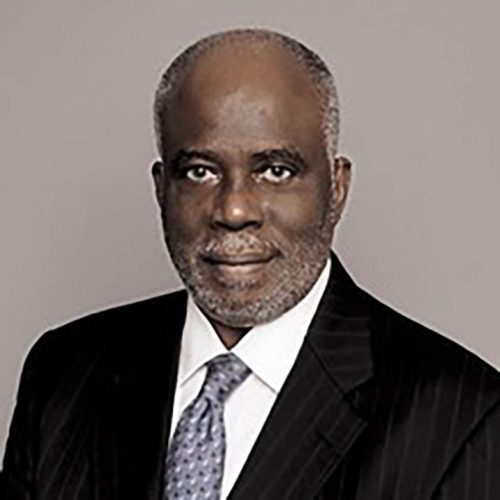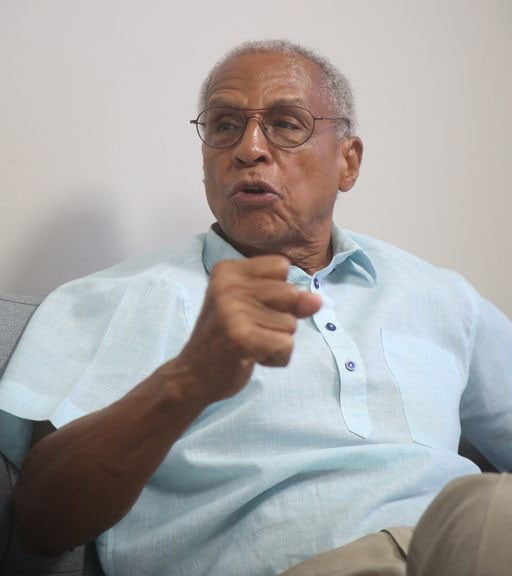(Trinidad Guardian) Two of T&T’s most respected economists, former minister of finance Wendell Mottley and former Central Bank governor Euric Bobb, are calling for a return of the managed flotation of the TT dollar that was first introduced in April 1993.

They argued that the managed flotation of the TT dollar “worked reasonably well for over two decades, a period during which a remarkable industrial policy saw T&T become a gas-based economy with a world-class presence in the markets for LNG, ammonia, methanol, UAN, and melamine.”
Mottley served as T&T’s minister of finance between 1991 and 1995, during which he oversaw the flotation of the TT dollar. He received the Order of the Republic of Trinidad and Tobago (ORTT), this country’s highest honour, on November 1, 2018.
Dr Euric Bobb is a Cambridge-trained economist who served as governor of the Central Bank of T&T from 1984 to 1988. He received the Chaconia Medal (gold), T&T’s second highest honour, in 1994.
Last Friday, the International Monetary Fund issued a statement to Guardian Media pointing out that T&T’s foreign exchange restrictions are inconsistent with the IMF’s Articles of Agreement.
In a news release on Sunday, Minister of Finance, Colm Imbert, said the Government had maintained T&T’s fixed exchange rate to control inflation, which he claimed is now almost the lowest in the world. In a jointly authored essay, Mottley and Bobb noted that in recent months, access to foreign exchange (forex) has become a major issue of public concern: “Parents worry about paying fees for children studying overseas; businessmen are distressed at the prospect of not being able to pay foreign suppliers in a timely manner; householders want to buy goods online for which they have enough local currency (TTD).
“Both of us have been there before in our professional lives, notably in 1977, 1983 and 1991, when there was similar loud clamour for the Government ‘to do something’.
“Therefore, we consider it useful to illuminate the ongoing discussion by laying out, in simple fashion, some of the basic facts about the supply of and demand for forex.”
They pointed out that as a small, open economy, T&T must import goods and services to meet a significant share, at least 50 per cent, of its expenditure for consumption and investment. The buoyancy of this demand is determined by the overall state of the economy, while its composition shifts depending on the mix between investment and consumption and the changing preferences of consumers.
Under today’s economic circumstances, demand for forex exceeds supply. There is no reason why supply and demand should autonomously balance over any given period. Hence, mechanisms are needed to allocate the supply of foreign exchange among competing demands.
The economists pointed out that in April 1993, T&T’s bureaucratic system for the allocation of foreign exchange, which was in force since 1942, was replaced by a market-based system.
They said the major elements of the reform were:
The exchange rate would be determined under a managed float influenced by overall economic circumstances;
Controls on both current and capital transactions were abolished;
Foreign exchange earners were allowed to open US$ accounts in local banks or keep their funds overseas; and
Local banks were declared authorised dealers to interact directly with customers wishing to buy and sell foreign exchange.
Mottley and Bobb pointed out that T&T’s world-class infrastructure for the production and monetisation of natural gas stimulated a strong inflow of forex. They noted that the production of natural gas reached a peak of about 4 billion standard cubic feet per day (MMSCF/D) in 2014 and is now approximately 2.491MMSCF/D.
“While the supply of forex has declined, demand has remained high. The public became accustomed over a generation to market conditions that no longer exist and have not adapted to the changed circumstances,” they added.
They said that the sustained high demand for foreign exchange over recent years has in part been fuelled by persistent fiscal deficits, which feed liquidity in the banking system. Mottley and Bobb also noted that over the last several years, as the flow of foreign exchange fell short of demand, T&T drew on its stock of official foreign exchange reserves, which fell from US$7 billion at the end of 2020 to US$5.6 billion in August 2024.
“This imbalance between current demand and current supply cannot continue at the expense of further reduction of the stock of reserves now at only 7.8 months of import cover.”
They said while export-led diversification was necessary as T&T looks to the future, the energy sector will remain the main source of foreign exchange for a long time, especially with the good prospect of increased gas supply and, therefore, forex earnings in the next few years.
“Even so, our economic history teaches us that we should not risk being fully reliant on a resurgent supply of forex from the energy sector. We face a structural problem that can be fixed only by bringing demand into alignment with supply.
“Unlike the biblical miracle of the few loaves and fishes that fed a multitude, managing an economy is about trade-offs among competing demands. There is no miraculous solution to the recurring shortage of forex.
“Whatever may be done to reduce demand in the near term, there will remain a clear need for a system of allocating forex. As stakeholders continue to demand that ‘the Government do something’ we must not lose sight of the fact that experience teaches us that an administrative system is burdensome, inefficient and less effective than the market-based system in place over most of the last few decades,” the economists concluded.





